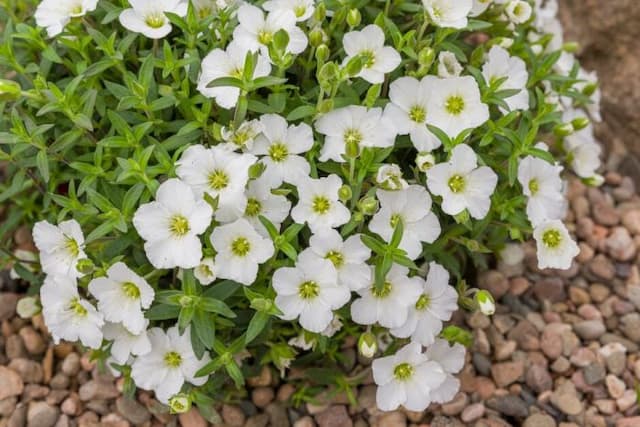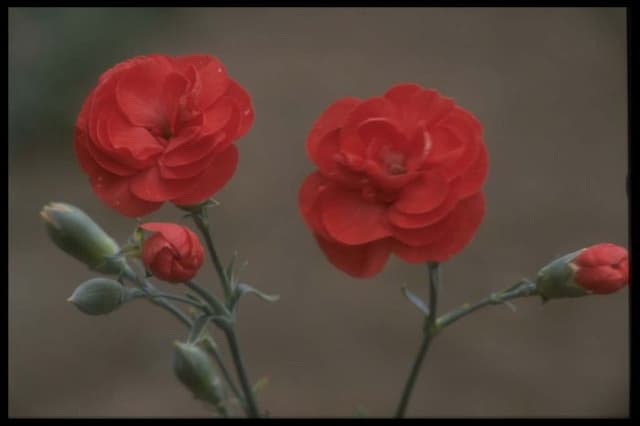Carnation Dianthus 'Devon Glow' (p)

ABOUT
Dianthus 'Devon Glow' is a striking flowering plant that features a vibrant array of colors and textures. The blooms are particularly eye-catching, with petals ranging from deep pinks to coral tones, often exhibiting a subtle gradient of shades. Each petal is typically fringed or serrated, creating a delicate, lacy effect that adds to the plant's overall charm. The foliage of Dianthus 'Devon Glow' provides a pleasant contrast to its vivid flowers. The leaves are slender and long, boasting a grayish-green hue that complements the brightness of the blossoms. They form a dense, grass-like clump at the base of the plant and provide a lush backdrop for the colorful display above. The flowers themselves are arranged in loose clusters atop sturdy stems which rise elegantly from the foliage. These clusters give a full and rounded appearance to the bloom display, making it look abundant and generous. The flowering stems are stiff enough to hold the blooms well above the leaves, drawing attention to their beauty. Between the bright flowers and the bluish-green foliage, Dianthus 'Devon Glow' is a plant that exudes cheerfulness and adds a splash of intense color to any space it inhabits.
About this plant
 Names
NamesSynonyms
Devon Glow Dianthus, Cheddar Pink, Sweet William.
Common names
Dianthus 'Devon Glow'
 Toxicity
ToxicityTo humans
Dianthus 'Devon Glow', commonly known as pinks, is not considered toxic to humans. There are no well-documented cases of poisoning from ingesting this plant, and it is generally regarded as safe. Therefore, accidental ingestion is unlikely to cause harm, though it's always advisable to avoid consuming parts of ornamental plants due to potential pesticide residue or individual allergies.
To pets
Pinks, the common name for Dianthus 'Devon Glow', are also not known to be toxic to pets. They are typically safe for cats and dogs, and there are no significant reports of pet poisoning from ingesting this plant. As with humans, though, it is best to prevent pets from eating ornamental plants to avoid any potential issues such as gastrointestinal upset, which could arise from non-toxic plant ingestion or sensitivities.
 Characteristics
CharacteristicsLife cycle
Perennials
Foliage type
Evergreen
Color of leaves
Blue-green
Flower color
Pink
Height
1 foot (30 cm)
Spread
1 foot (30 cm)
Plant type
Herb
Hardiness zones
5
Native area
Europe
Benefits
 General Benefits
General Benefits- Attracts Pollinators: Dianthus 'Devon Glow' provides nectar and pollen for bees and other beneficial insects.
- Vibrant Color: Its bright flowers add visual interest and aesthetic value to gardens and landscapes.
- Low Maintenance: This plant is known for being easy to care for, requiring minimal attention once established.
- Drought Tolerant: After establishment, it has good drought resistance, reducing the need for frequent watering.
- Cold Hardy: Able to withstand cold temperatures, making it suitable for a variety of climates.
- Long Blooming: Offers a prolonged bloom period, ensuring colorful displays for longer durations.
- Compact Size: Its relatively small size makes it suitable for borders, pots, and small gardens.
- Fragrance: The flowers emit a pleasant scent, enhancing the sensory experience of a garden.
 Medical Properties
Medical PropertiesThis plant is not used for medical purposes.
 Air-purifying Qualities
Air-purifying QualitiesThis plant is not specifically known for air purifying qualities.
 Other Uses
Other Uses- As an edible garnish: The petals of the Dianthus 'Devon Glow' add a pop of color and a slight spicy flavor to salads and desserts, enhancing the visual appeal of the dishes.
- In potpourri: Dried petals can be incorporated into homemade potpourri mixtures, adding fragrance and color to your home decor.
- As natural dye: The intensely colored petals can be used to create a natural dye for textiles, offering a sustainable alternative to synthetic dyes.
- Crafting soaps: The flowers can be used in soap making, either by embedding petals into the bars or infusing the oils with their scent.
- In perfumery: The essential oil from the Dianthus 'Devon Glow' flowers can be used as a component in perfumes, providing a unique floral aroma.
- Decorative ice cubes: Freezing petals in ice cubes can add an elegant touch to summer drinks and cocktails.
- In bookmarks and paper making: Pressed flowers can be used to create beautiful natural bookmarks or included in handmade paper for an artistic effect.
- As natural confetti: Instead of using synthetic confetti, dried petals can be thrown at celebrations like weddings for an eco-friendly alternative.
- In decorative wreaths and arrangements: Fresh or dried, these flowers can be included in wreaths and floral arrangements for doors, tables, or events.
- Insect deterrent: Some gardeners use the strong fragrance of Dianthus to help deter certain insects from their garden, although its efficacy can vary.
Interesting Facts
 Feng Shui
Feng ShuiThe Carnation is not used in Feng Shui practice.
 Zodiac Sign Compitability
Zodiac Sign CompitabilityThe Carnation is not used in astrology practice.
 Plant Symbolism
Plant Symbolism- Love: Dianthus, often referred to as 'pinks' or 'carnations,' is commonly associated with love and affection.
- Admiration: The vibrant hues of the 'Devon Glow' can symbolize deep admiration and fascination.
- Pure Affection: Carnations convey pure love and affection, stemming from their longstanding use as tokens of love.
- Distinction: The unique appearance of 'Devon Glow' with its bright colors and patterns may represent distinction and individuality.
- Gratitude: Carnations are often given to express gratitude, making them a symbol of appreciation and thanks.
 Water
WaterWhen watering your Dianthus 'Devon Glow', also known as Pinks, it's important to keep the soil consistently moist but not waterlogged. Provide deep waterings to encourage strong root development. Aim for about one inch of water per week, either from rainfall or manual watering. During hot, dry periods, you may need to water twice a week, while in cooler, wetter conditions, watering once every ten days might suffice. Use enough water to wet the soil to the depth of the roots; for potted plants, this typically means until water runs out of the drainage holes at the bottom of the container.
 Light
LightPinks thrive in full sun conditions, which means they require at least six hours of direct sunlight each day. The best spot for Dianthus 'Devon Glow' would be an area where it can receive unfiltered sunlight for most of the day. However, in very hot climates, these plants appreciate some light afternoon shade to prevent scorching.
 Temperature
TemperaturePinks are fairly adaptable to temperature variations but prefer cooler conditions. They can survive minimum temperatures down to about 40 degrees Fahrenheit but are happiest in a range between 60 to 70 degrees Fahrenheit. They can tolerate up to about 85 degrees Fahrenheit, but consistently higher temperatures, especially at night, may lead to poor performance.
 Pruning
PruningPruning Pinks should be done to promote bushier growth, remove dead or spent flowers, and maintain a neat appearance. Deadheading or removing old blooms will encourage more blooms. It's best to prune these plants in late spring after the first flush of flowering has completed. Annual light pruning is often enough to keep the plants in good shape.
 Cleaning
CleaningAs needed
 Soil
SoilCarnations like well-draining, loamy soil with a neutral to slightly alkaline pH of 6.7 to 7.5. A mix of two parts loam, one part sand, and one part compost provides an ideal growing medium for healthy growth.
 Repotting
RepottingCarnations should typically be repotted every two to three years to refresh the soil and accommodate root growth, ensuring they are not becoming root-bound.
 Humidity & Misting
Humidity & MistingCarnations prefer moderate to low humidity levels as they are susceptible to fungal diseases when conditions are too moist.
 Suitable locations
Suitable locationsIndoor
Place in bright, indirect light with good airflow for healthy growth.
Outdoor
Plant in full sun with well-draining soil and space for air circulation.
Hardiness zone
3-9 USDA
 Life cycle
Life cycleDianthus 'Devon Glow', also commonly known as Cheddar Pinks, begins its life cycle as a seed, which under favorable conditions of warmth and moisture, germinates to produce a small seedling. The seedling grows into a young plant, developing a rosette of narrow, green leaves and a strong root system. As the plant matures, it enters the vegetative stage and forms buds that will turn into the characteristic bright pink, fragrant flowers which are often used in ornamental gardening. After pollination, often by insects attracted by the flowers’ scent and color, these flowers produce seeds, enabling the cycle to repeat when these seeds fall to the ground and find suitable conditions for growth. In colder climates, Cheddar Pinks can enter a period of dormancy over winter, conserving energy until warmer temperatures return. Under optimal conditions, Dianthus 'Devon Glow' may also spread through rhizomes or by cuttings taken from the main plant, thereby expanding its growth beyond seed propagation.
 Propogation
PropogationPropogation time
Spring-Early Summer
Dianthus 'Devon Glow', commonly known as pinks, can be propagated through stem cuttings, which is the most popular method. Typically, the best time to take stem cuttings is in late spring to early summer when the plant's growth is vigorous. To propagate by cuttings, a gardener would select healthy, non-flowering stems and cut a 3 to 4-inch length (7.5 to 10 cm), just below a leaf node. The leaves on the lower half of the cutting should be removed, and the cut end dipped in rooting hormone for better root development. The cutting is then inserted into a well-draining soil mix, watered gently, and covered with a plastic bag or placed in a propagator to maintain high humidity. Roots usually develop within a few weeks after which the new plant can be transferred to a larger pot or directly into the garden.


![Pink [Tequila Sunrise]](/_next/image?url=https%3A%2F%2Fplants-admin.emdemapps.com%2Fimages%2Fplants%2F%2Fimages%2F604b5d995d06e.png&w=640&q=75)






